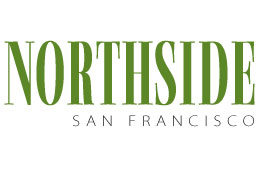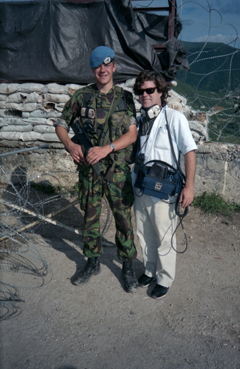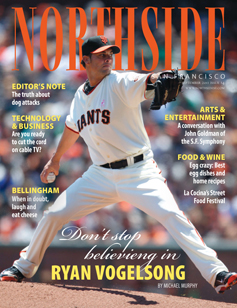 |
 |
|||||||
|
From the Global Affairs Desk in North Beach 
A British U.N. peacekeeper and McFetridge relax
during a break in NATO bombing campaign of Bosnian Serb targets I never met Richard Holbrooke nor have I ever covered him, but did I ever see his work in both Bosnia and Herzegovina and Kosovo. I’ll start with a typical August day in Sarajevo in 1995 — if you can call the Bosnian Muslim capital city on a valley floor surrounded by Serb artillery, machine guns and snipers in the Dinaric Alps above it — typical. It was quieter than my first tour in 1994 when some 1,500 artillery shells a day were raining down. I was working for Channel One News, the ten-minute newscast pumped into classrooms with two minutes of commercials. Some teachers hated us, others loved the newscast, and most of the eight million kids were either indifferent or huge fans. Hey, they’re kids. My news team, seasoned combat cameraman and fun-loving Australian Mike Charlton and veteran (Newsweek, Rolling Stone, to name a few) Bosnian scribe-turned-TV-correspondent Joel Brand, was out profiling a Bosnian teen trying to eek out some normalcy while sprinting to and from school behind overturned busses used to block Serb sniper bullets. At the Bosnian TV building (a huge building built by ABC Sports czar Roone Arledge for the 1984 Olympics) where the world’s press corps assembled, I was having Turkish coffee with a Bosnian who warned me not to report Sarajevo as a freak show — a place where war had made a macabre spectacle of the survival of the Bosnian people and government; a place where fine dining had been replaced by UN food rations; a former Olympic city whose mountains were used for target practice on Sarajevans instead of skiing; a place where running through sniper zones was commonplace for every man, woman and child; a place where Europe proved it just couldn’t hack it diplomatically or militarily; a place the U.N. had made a virtual prison with a travel ban for civilians and an arms embargo for an outgunned and outmanned Bosnian Army; and a place where the ethnic groups (Eastern Orthodox Serbs, Catholic Croats, Muslim Bosnians, and Jews) of the former Yugoslavia all coexisted peacefully for centuries. Not anymore. A series explosion interrupted our conversation, and it wasn’t the usual cacophony of small arms fire constantly heard in the Bosnian capital. “What was that?” I saw Worldwide Television News producer Faradoun Hamami (whose eyes were damaged by a crude Serb bomb that hit the Bosnian TV building a few months earlier — Serb paramilitaries, or Chetniks, had tied four rockets to a MIG fighter’s 2,000-pound bomb and somehow the contraption flew down the mountain and hit Bosnian TV). Faradoun said, “Markele market downtown has been hit by an artillery shell. Where is your crew, Matt?’ “Near the airport.” “(Expletive), so is mine.” We used WTN’s edit bays and satellite to cut and then bird our stories out, so we worked well together. Mike and Joel didn’t respond on their radio to my pleas to get downtown to the bombsite, but I did have the Bosnian kid’s landline and dialed it. Joel got on the line: “ Yeah, we heard about it, we’re on our way. I hope we get there before they seal it off.” U.N. troops, the Bosnian Army and law enforcement would typically shut down shelling sites to collect evidence for The Hague’s War Crimes Tribunal and to lay blame on the Serbs who usually denied every horrible deed. This one was really horrible. Five mortar shells had killed 37 people and injured another 90. A year earlier the same market was hit, killing 68 and wounding 144 more. Luckily, my team got there and got some scarcely usable pictures of body parts and decapitated bodies. A 120-millimeter mortar shell can do a lot of damage to humans in a crowded market. The shrapnel is lethal, especially when it hits concrete and sprays in all directions like this one did. We interviewed some eyewitnesses and then were promptly moved from the area. Back at Bosnian TV headquarters, I arranged for Joel to speak with Bosnian Prime Minister Haris Silajdzic, who was making the rounds. He called for bold and decisive action by NATO and the international community. We had cut a good story and put the carnage in perspective; instead of “if it bleeds, it leads,” the typical TV news mentality. The bosses in Los Angeles liked our piece, which was good, because they spent a lot to get us and keep us there. At Channel One, we could go three to four minutes with longer, more explanatory sound bites, unlike our friends in the network news who lived in the quick and dirty, minute-thirty world. Even a seasoned Bosniac reporter, the BBC’s Martin Bell (who was wounded by a Serb sniper) said it was splendid. Because of a curfew, most of the press corps was back at the Holiday Inn on Marshall Tito Boulevard, and it was a heck of a party. The hotel was the distance of about three football fields from Grbavica, the first front of the war, and usually we’d hear small arms fire all night, but that night it was eerily quiet. We all had had a good day, and up on the 14th floor, the “Cyprus Boys” were having a bash, cranking Jamiroquai’s “Emergency on Planet Earth” (how apropos). The Cyprus Boys were a group of freelance cameramen, editors and satellite techs who lived on the Greek half of Cyprus because the airport there was user friendly and flights could be hopped to hot spots in Europe, Africa and the Middle East. There were Australians, Kiwis, South Africans, Englishmen, and one American named Keith, who was called Chuck. Why? Aren’t all Americans named Chuck? Over several Amstels and shots of Jack Daniels, it was my first chance to shoot the breeze with the press corps. Many had been there a year before for the last massacre and seen a U.N. and NATO response go from robust to anemic as U.N. peacekeepers were used as human shields on possible Serb targets. Jackie Shumansky, a veteran CNN producer-correspondent wondered if there would be any retaliatory response at all. Then she demanded we stop talking about work and party, so we did. Back at NATO headquarters in Brussels, U.S. Special Envoy to Bosnia Richard Holbrooke wasn’t drinking lager and shots, cranking English soul music like we were in the Bosnian capital. He was going over Serb targets in mountains above Sarajevo and trying to keep the information away from the Greek NATO members who would spill the beans to their Eastern Orthodox Serbian brothers and ruin the element of surprise. Matt McFetridge is a two-time Emmy Award-winning television producer who has covered 20 wars in 20 countries over 20 years. E-mail: matt@northsidesf.com |
||||||||
 |
||||||||
|
||||||||

  |
||||||||

